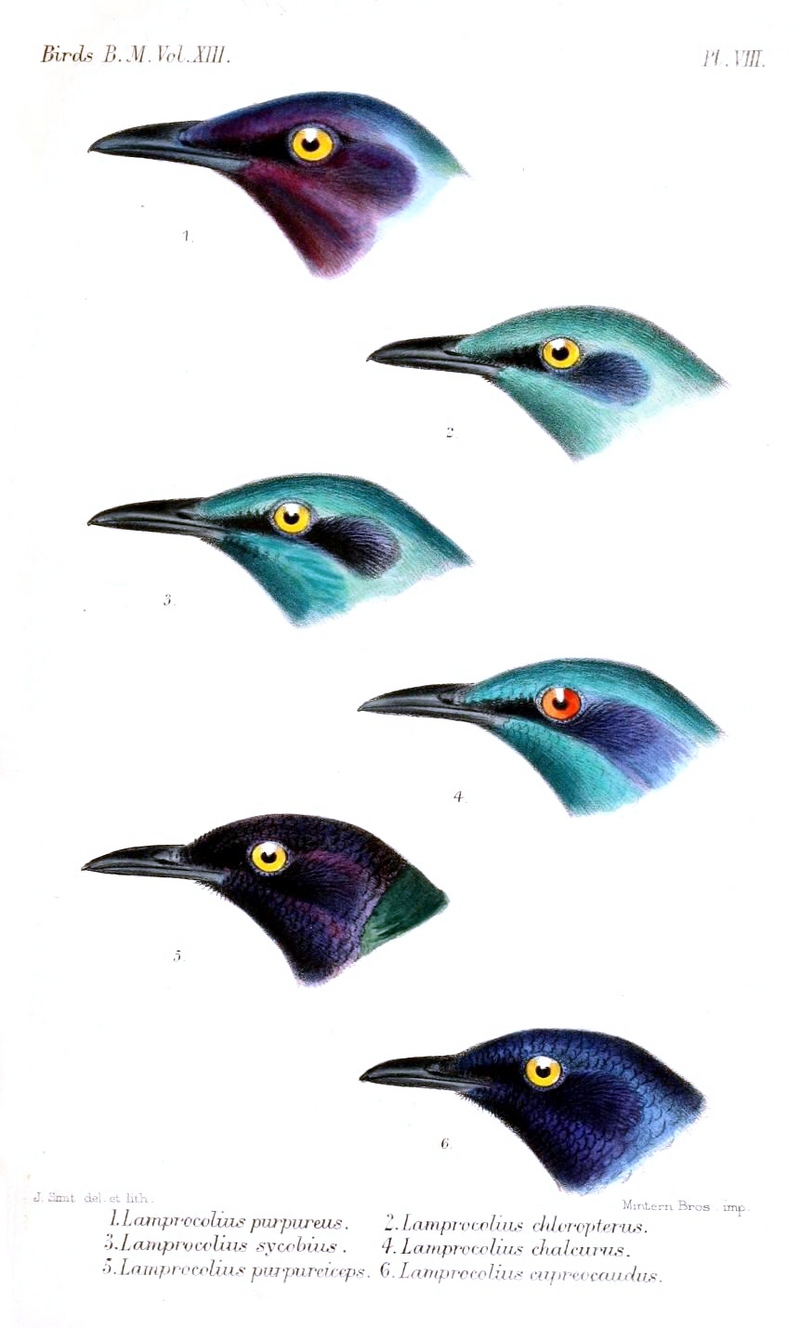|
| Query: british museum | Result: 141st of 154 | |
purple glossy starling (Lamprotornis purpureus), lesser blue-eared glossy-starling (Lamprotornis chloropterus), greater blue-eared glossy-starling (Lamprotornis chalybaeus), bronze-tailed glossy-starling (Lamprotornis chalcurus), purple-headed starling (Hylopsar purpureiceps), copper-tailed glossy-starling (Hylopsar cupreocauda)
| Subject: | purple glossy starling (Lamprotornis purpureus), lesser blue-eared glossy-starling (Lamprotornis chloropterus), greater blue-eared glossy-starling (Lamprotornis chalybaeus), bronze-tailed glossy-starling (Lamprotornis chalcurus), purple-headed starling (Hylopsar purpureiceps), copper-tailed glossy-starling (Hylopsar cupreocauda)
| | Poster: | Wiki Photos (---@---.---)
| |

| Resolution: 861x1429
File Size: 180756 Bytes
Upload Date: 2017:03:29 12:46:56
|
1. (top left) Lamprocolius purpureus (P. L. S. Müll.) = Lamprotornis purpureus (P.L.S.Müller, 1766)
2. (top right) Lamprocolius chloropterus (Swains.) = Lamprotornis chloropterus Swainson, 1838
3. (center left) Lamprocolius sycobius (Licht.) = Lamprotornis chalybaeus sycobius (Hartlaub, 1859)
4. (center right) Lamprocolius chalcurus (Nordm.) = Lamprotornis chalcurus Nordmann, 1835
5. (bottom left) Lamprocolius purpureiceps (Verr.) = Hylopsar purpureiceps (J. & E.Verreaux, 1851)
6. (bottom right) Lamprocolius cupreocaudatus [sic] (Hartl.) = Hylopsar cupreocauda (Hartlaub, 1857)
English: Purple Glossy-starling (top left), Lesser Blue-eared Glossy-starling (top right), Greater Blue-eared Glossy-starling (center left), Bronze-tailed Glossy-starling (center right), Purple-headed Glossy-starling (bottom left), Copper-tailed Glossy-starling (bottom right)
Date 1890
Source Catalogue of the birds in the British Museum (Vol. 13 Plate VIII)
Author Joseph Smit (1836–1929), Richard Bowdler Sharpe (text)
Source: https://commons.wikimedia.org/wiki/File:Lamprocolius2Smit.jpg
The purple starling (Lamprotornis purpureus), also known as the purple glossy starling, is a member of the starling family of birds. It is a resident breeder in tropical Africa from Senegal and north Zaire east to Sudan and west Kenya. This common passerine is typically found in open woodland and cultivation.
The lesser blue-eared starling or lesser blue-eared glossy-starling (Lamprotornis chloropterus) is a species of starling in the family Sturnidae. It is found in Benin, Burkina Faso, Burundi, Cameroon, the Central African Republic, Chad, the Democratic Republic of the Congo, Eritrea, Ethiopia, Gambia, Ghana, Guinea, Guinea-Bissau, Ivory Coast, Kenya, Liberia, Malawi, Mali, Mozambique, Namibia, Nigeria, Senegal, Sierra Leone, South Sudan, Sudan, Tanzania, Togo, Uganda, Zambia, and Zimbabwe.
The greater blue-eared starling or greater blue-eared glossy-starling (Lamprotornis chalybaeus) is a bird that breeds from Senegal east to Ethiopia and south through eastern Africa to northeastern South Africa and Angola. It is a very common species of open woodland bird, and undertakes some seasonal migration.
The bronze-tailed starling or bronze-tailed glossy-starling (Lamprotornis chalcurus) is a species of starling in the family Sturnidae. It is found in Benin, Burkina Faso, Cameroon, the Central African Republic, Chad, the Democratic Republic of the Congo, Gambia, Ghana, Guinea, Guinea-Bissau, Ivory Coast, Kenya, Mali, Niger, Nigeria, Senegal, South Sudan, Sudan, Togo, and Uganda.
The purple-headed starling (Hylopsar purpureiceps), also known as the purple-headed glossy-starling, is a species of starling in the family Sturnidae. It is found in Angola, Benin, Cameroon, Central African Republic, Republic of the Congo, Democratic Republic of the Congo, Ivory Coast, Equatorial Guinea, Gabon, Guinea, Nigeria, and Uganda.
The copper-tailed starling or copper-tailed glossy-starling (Hylopsar cupreocauda) is a species of starling in the family Sturnidae. It is found in Ivory Coast, Ghana, Guinea, Liberia, and Sierra Leone. Its natural habitat is subtropical or tropical moist lowland forests. It is threatened by habitat loss. |
^o^
Animal Pictures Archive for smart phones
^o^
|
|